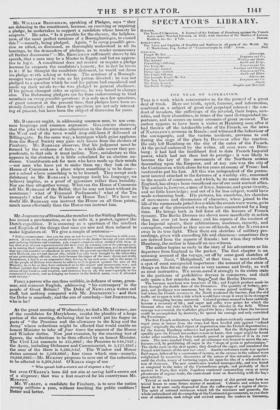Mr. WILLIAM BROUGHAM, speaking of Pledges, says " they are
debasing to the constituent, because, on receiving or requiring a pledge, he undertakes to support a candidate whose honesty he suspects." He asks, " Is it possible for the slavery, the helpless- ness, of the most perfect nominee of a Boroughmonger, to exceed this ?"—namely, being pledged. Again, " Is every possible ques- tion so sifted, so discussed, so thoroughly understood in all its bearings, by the demanders of pledges, as to render unnecessary all further discussion ?"—Mr. BROUGHAM sufficiently shows by his speech, that a man may be a Master in Equity and but an appren- tice in log's. A constituent does not receive or require a pledge because he suspects the candidate's honesty, fur in fact he trusts to it : if he thought the candidate dishonest, he would not deem his pledge wcrth asking or taking. The nominee of a Borough- monger was expected to vote as his patron directed : he was not pledged to a question which he and his patron bad considered and made up their minds to—he was pledged to general obedience. If his patron changed sides or opinions, he was bound to change also. The Reforming pledgers are flu- from endeavouring to bind members on every possible question: it is only on a few questions, of great interest at the present time, that pledges have been se- riously demanded ; and these few questions are not only interest- ing at present, but have been the subject of discussion for years.



























 Previous page
Previous page